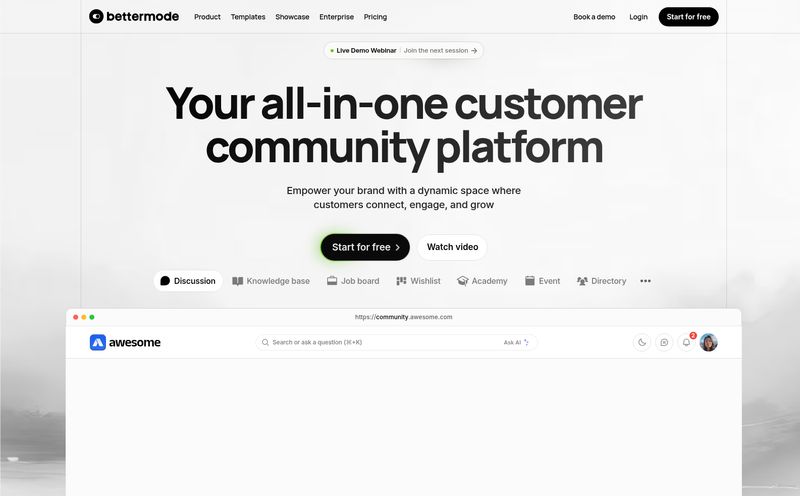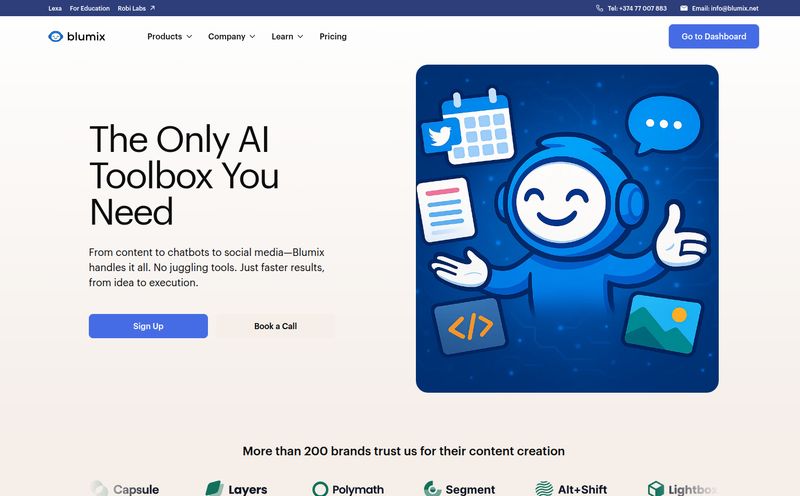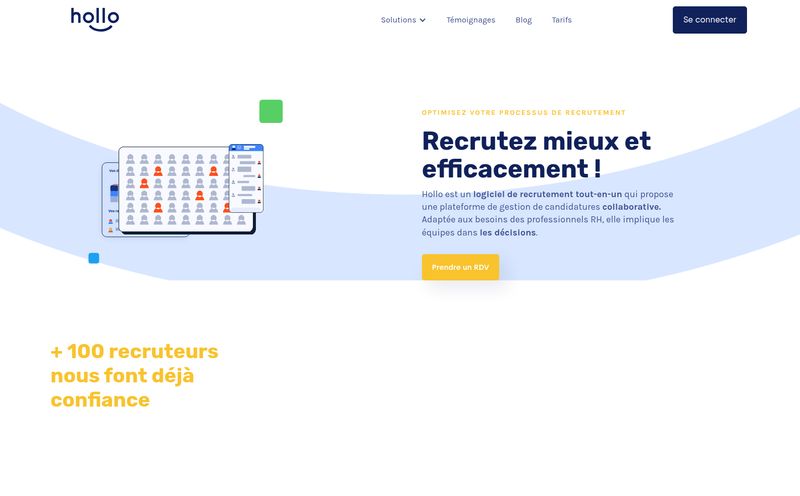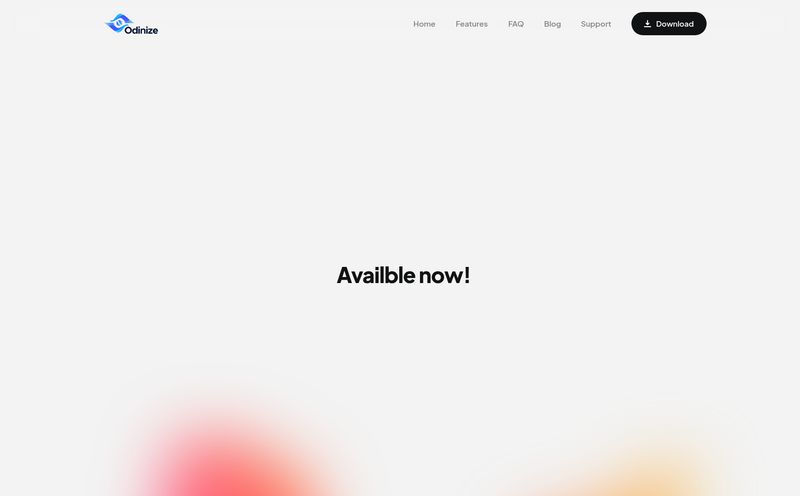You and me. How many PDFs are sitting in your downloads folder right now? Go on, I'll wait. If you're anything like me, a digital marketer who swims in a sea of market research, competitor analysis, and campaign reports, the answer is probably 'too many'. They just sit there. Like digital paperweights. Some are short and sweet. Others are... well, they're 200-page behemoths that you know you need to read but just can't bring yourself to open.
For years, the solution was a pot of strong coffee and the trusty Ctrl+F command. But that only gets you so far. It can find a word, but it can't find an idea. It can't summarize a chapter or compare findings across three different reports. This is the exact headache that a new wave of AI tools promises to cure. Today, I'm looking at one of them that caught my eye: Docalysis.
So, What is Docalysis Anyway?
In the simplest terms, Docalysis is an AI-powered chatbot that lets you talk to your documents. You upload a PDF (or several), and instead of reading it cover to cover, you just ask it questions. Think of it less like a document reader and more like a personal research assistant. One who has already read everything, has perfect memory, and is just waiting patiently for your questions. Sounds pretty good, right?
The whole premise, as you can see from their site, is built on three pillars:
- AI-Powered: It uses artificial intelligence to understand the context and content of your files, not just keywords.
- Save Time: This is the big one. They make a bold claim of saving 95% of your reading time. We'll get to that later.
- Secure: Your files are yours. They're kept secure and you can delete them whenever you want. This is a huge sigh of relief for anyone handling sensitive client or company data.
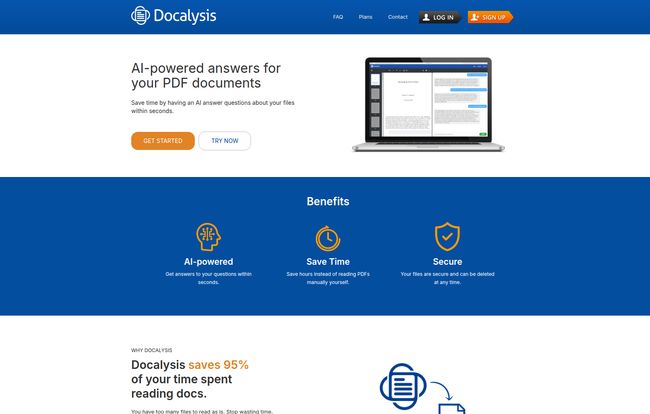
Visit Docalysis
My First Impressions and The Core Experience
The interface is clean, no-nonsense. You're not bombarded with a million buttons or confusing menus. It's pretty much just: here's a box, put your file in it. I appreciate that. The last thing I need is another tool with a steep learning curve.
Putting a Single Document on the Hot Seat
The primary function is as simple as it sounds. I uploaded a 45-page social media trends report from last quarter. Instead of spending an hour skimming, I just started asking questions:
- "What was the main takeaway about video content on Instagram?"
- "Summarize the section on TikTok's growth among Gen Z."
- "Are there any statistics mentioned about influencer marketing ROI?"
Within seconds, Docalysis spat back accurate, concise answers with references to the page numbers. That last part is critical. It’s not just making things up; it's showing you its work. This is a massive improvement over just using a generic chatbot and pasting text in.
The Real Magic is in the Multi-File Chat
Here’s where I really started to get excited. Docalysis has a multi-file chat feature. This was something I'd been dreaming of. Last month, I had to synthesize three different competitor analysis reports into a single summary slide. It took me the better part of a day, flipping between tabs, cross-referencing data, and losing my train of thought every ten minutes.
With Docalysis, you can upload all three reports into one chat session. Then you can ask questions like, "Across all three documents, what are the common weaknesses identified in Competitor X's strategy?" or "Compare the Q4 revenue figures mentioned in the 'Alpha Report' and the 'Beta Report'."
This is a game-changer. It transforms your documents from isolated silos of information into a unified, queryable database. Instead of panning for gold in a river of text, you just ask the river where the gold is.
That 95% Time-Saving Claim... Is It Real?
Okay, let's address the elephant in the room. A 95% time saving is an incredibly bold marketing claim. And I'm naturally skeptical of numbers that neat. So, is it true? My answer is a firm... it depends.
If your task is purely information retrieval – finding a specific stat, a name, a date, or a key policy point – then yes, 95% feels pretty accurate. A task that would take you 30 minutes of skimming might take you 30 seconds of typing a question. In that context, the claim holds up.
However, if your goal is deep, nuanced understanding, critical analysis, or absorbing the author's unique voice, then no AI can replace the human brain. At least, not yet. I wouldn't use it to 'read' a piece of literature or a complex philosophical text and expect to grasp the soul of it. But for the vast majority of our professional document-wading? It gets you most of the way there, and it gets you there fast.
A Look at the Docalysis Pricing Tiers
Alright, money talk. Docalysis isn't a one-price-fits-all tool. They have a tiered system, which I think is smart. It lets you pick the plan that actually fits your needs, from a casual user to a full-on enterprise team. Here's a quick breakdown I've put together based on their pricing page.
| Plan | Price | Key Features & Limits |
|---|---|---|
| Free | $0 / month | 50 questions/month, 600 pages/month upload, 150 pages/file, 5MB file size. Great for a test drive. |
| Plus | $14 / month | 500 questions/month, 3,000 pages/month upload, 600 pages/file, 20MB file size, Email support. |
| Ultimate | $35 / month | 1,500 questions/month, 8,000 pages/month upload, 1,800 pages/file, 50MB file size, Email support. |
| Business | Custom | Custom limits for everything, team admin, and phone support. For the big leagues. |
In my opinion, the pricing feels fair. The Free plan is genuinely useful for students or for someone who only deals with a few reports a month. The Plus plan at $14 feels like the sweet spot for most professionals. When you weigh that against even one or two billable hours saved, it pays for itself almost instantly.
The Not-So-Great Stuff: Limits and Credits
No tool is perfect, and it's important to be realistic. The biggest thing to watch out for with Docalysis is the limits. The model is built around question credits, page uploads, and file sizes. If you're a power user on the 'Plus' plan, it's conceivable you could burn through your 500 questions before the month is up.
You can purchase bonus credits, but it's something to be aware of. You have to be a little mindful of your usage. Also, the file size limits could be a factor for some. If you're an architect working with massive high-res plans or a paralegal with a 5,000-page discovery document, you'll need to look at the Ultimate or Business plans. It's crucial to check these limits against your typical workload before commiting to a plan.
So Who Is Docalysis Really For?
I see a few groups getting a massive benefit here. Students and academics drowning in research papers will find this invaluable for literature reviews. Legal professionals can instantly find specific clauses in lengthy contracts. Marketers and business analysts, like myself, can digest reports and surveys in a fraction of the time. And consultants who have to get up to speed on a new client's entire operational history yesterday? This could be a lifesaver.
Frequently Asked Questions About Docalysis
- How do the question credits actually work?
- Each question you ask the AI costs one credit. Your plan gives you a set amount each month (e.g., 500 on the Plus plan). The credits reset on your billing cycle date, not necessarily the 1st of the month.
- What happens if I use all my monthly credits?
- You won't be able to ask more questions until your plan renews. However, Docalysis offers the option to purchase 'bonus credits' to top up your account if you run out early. It's a pay-as-you-go model for extra usage.
- How does this compare to just using Ctrl+F?
- It's a night and day difference. Ctrl+F finds specific strings of letters. Docalysis understands context and concepts. You can ask "What does this report conclude about market sentiment?" and it will synthesize information from multiple paragraphs, something Ctrl+F could never do.
- Can I cancel my subscription at any time?
- Yes, their site confirms you can cancel at any time. If you cancel, your plan will remain active until the end of your current billing period, so you don't lose out on the time you've already paid for.
- How secure is my data when I upload a document?
- Docalysis states that files are stored securely and, importantly, you have the option to delete them at any time. They also use Stripe for payment processing, which is a top-tier secure provider, so they don't store your credit card information on their own servers.
My Final Verdict: Is Docalysis Worth Your Time and Money?
After spending some time with it, I'm genuinely impressed. Docalysis isn't just another shiny AI toy; it's a focused tool that solves a very real, very annoying problem. The problem of information overload locked away in the world's most popular, yet most static, document format.
It's not going to do your thinking for you, but it will clear away all the tedious underbrush so you can get to the thinking part faster. It turns passive reading into an active conversation. For any professional who values their time—and whose time is money—I believe Docalysis is absolutely worth a look. The free plan is generous enough that you have nothing to lose by taking your most-dreaded PDF for a spin.
Reference and Sources
- Docalysis Official Website
- Docalysis Pricing Page
- Harvard Business Review - Death by Information Overload
